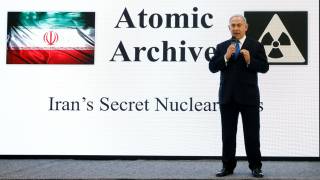Colin Powell Acknowledges that Iran does not Possess Nuclear Weapons
Colin Powell Acknowledges that Iran does not Possess Nuclear Weapons
By Chris Dolmetsch | GlobalResearch.ca
“The Iranians are determined to have a nuclear program, ... Notice I did not say a nuclear weapon. But they are determined to have a nuclear program, notwithstanding the last six or seven years of efforts on our part to keep them from having a nuclear program.”
Former U.S. Secretary of State Colin Powell said new sanctions on Iran to persuade it to stop enriching uranium won’t work because the Islamic republic is “determined to have a nuclear program.”
“I don’t see a set of sanctions coming along that would be so detrimental to the Iranians that they are going to stop that program,” Powell said in an interview with Bloomberg special contributor Judy Woodruff. “So ultimately, the solution has to be a negotiated one.”
The U.S. is working with Britain, France, Russia, China and Germany to persuade Iran to give up enriching uranium, a process that can lead to an atomic bomb. While Iran says it is pursuing enrichment for non-military uses such as energy and medical research, its government hasn’t taken up offers aimed at meeting that goal in other ways.
“The Iranians are determined to have a nuclear program,” Powell said in the interview, which will be broadcast on Bloomberg Television’s “Conversations with Judy Woodruff” this weekend. “Notice I did not say a nuclear weapon. But they are determined to have a nuclear program, notwithstanding the last six or seven years of efforts on our part to keep them from having a nuclear program.”
The U.S. and its European allies are pushing for a fourth round of United Nations sanctions against Iran to force it to return to negotiations over its uranium-enrichment work.
Speaks With Obama
A Republican who endorsed Democrat Barack Obama in the 2008 election, Powell said the president speaks to him “on a fairly regular basis,” usually by himself, and allows him to be candid. He said Obama has “pretty much kept in place” the terrorism policies of President George W. Bush, under whom Powell served from 2001 to 2005.
Powell declined to take a position on legislation to overhaul the U.S. health-care system, which he said has become a “political distraction” for Obama.
“I would just like to see it dealt with,” Powell said. “And if it is passed, it may not be the total solution. But at least it shows we can get something passed so we can improve in the future, add to it, take away from it in the future so that we, ultimately, get all of our citizens covered.”
Regarding China, Powell said there would be a backlash from the Asian nation if the Obama administration declares that it is manipulating its currency, the yuan.
Relations between the U.S. and China have become strained over the past few months because of Obama’s meeting with the Dalai Lama and American arms sales to Taiwan, Powell said.
China’s Currency
“There would be a very negative response from China,” he said. “They don’t like being instructed as to how they should value their currency.”
U.S. lawmakers this week introduced legislation to make it easier for the Obama administration to declare currency misalignments and take corrective action. The Treasury Department is set to decide next month whether to accuse China of manipulating the yuan.
The relationship between the U.S. and China is strong enough to find a way forward on the issues, and there is a shared interest in maintaining ties between the two countries, said Powell.
“The Chinese are feeling a little bit under pressure right now from the United States, and they are pushing back,” the former secretary of State said. “And they are pushing back harder than they usually do.”
Israeli ‘Slap’
Israel’s announcement that it would build 1,600 new apartments in east Jerusalem while U.S. Vice President Joseph Biden was visiting last week was a “bit of a slap in the face,” yet the U.S. needs to be “careful not to overreact,” said Powell, a retired Army general who previously served as chairman of the Joint Chiefs of Staff.
“Maybe out of this we can start moving forward,” Powell said. “Maybe the Israelis will be a little bit more careful about announcing settlement activity.”
The recent elections in Iraq have shown that it might be harder to put together a coalition government in the country than had been anticipated, said Powell, who deemed Bush’s decision to go to war there the “right call.” The latest tally of votes shows Prime Minister Nouri al-Maliki’s Shiite Muslim- dominated bloc with a slight lead in the parliamentary election.
Powell said he was disappointed during the 2008 U.S. elections that some candidates he thought would bring a “broader spectrum” to the Republican party felt the need to move to the far right of previous positions they held in order to win primaries. The party may lose races if it continues to appeal to those voters, he said.
Powell said he isn’t comfortable with some of the “extreme positions” taken by Republican media figures and commentators, such as Rush Limbaugh.
“The middle is in doubt right now,” Powell said. “President Obama has lost some of it. Republicans can pick up some of it. But Republicans have got to understand, I believe, that if they want to be a party that serves all of America and reaches out to all of America, it has to also listen to, or respond to, the aspirations of all of Americans and not just the far right base.”
Article from: GlobalResearch.ca
So, considering the next article, which is it?
Powell Says Iran Is Pursuing Bomb (2004)
By Robin Wright and Keith B. Richburg | WashingtonPost.com
The United States has intelligence that Iran is working to adapt missiles to deliver a nuclear weapon, further evidence that the Islamic republic is determined to acquire a nuclear bomb, Secretary of State Colin L. Powell said Wednesday.
Separately, an Iranian opposition exile group charged in Paris that Iran is enriching uranium at a secret military facility unknown to U.N. weapons inspectors. Iran has denied seeking to build nuclear weapons.
"I have seen some information that would suggest that they have been actively working on delivery systems. . . . You don’t have a weapon until you put it in something that can deliver a weapon," Powell told reporters traveling with him to Chile for an Asia-Pacific economic summit. "I’m not talking about uranium or fissile material or the warhead; I’m talking about what one does with a warhead."
Powell’s comments came just three days after an agreement between Iran and three European countries -- Britain, France and Germany -- designed to limit Tehran’s ability to divert its peaceful nuclear energy program for military use. The primary focus of the deal, accepted by Iran on Sunday and due to go into effect Nov. 22, is a stipulation that Iran indefinitely suspend its uranium enrichment program.
The issue of adapting a missile is separate from the question of enriching uranium for use in a weapon.
"I’m talking about information that says they not only have these missiles, but I am aware of information that suggests that they were working hard as to how to put the two together," Powell said, referring to the process of matching warheads to missiles. He spoke to reporters during a refueling stop in Manaus, Brazil.
"There is no doubt in my mind -- and it’s fairly straightforward from what we’ve been saying for years -- that they have been interested in a nuclear weapon that has utility, meaning that it is something they would be able to deliver, not just something that sits there," Powell said.
Iran has long been known to have a missile program, while denying that it was seeking a nuclear bomb. Powell seemed to be suggesting that efforts not previously disclosed were underway to arm missiles with nuclear warheads.
Joseph Cirincione, director of the Non-Proliferation Project at the Carnegie Endowment for International Peace, said Powell’s remarks indicated that Iran was trying to master the difficult technology of reducing the size of a nuclear warhead to fit on a ballistic missile.
"Powell appears to be saying the Iranians are working very hard on this capability," Cirincione said. He said Powell’s comments were striking because the International Atomic Energy Agency said this week that it had not seen any information that Iran had conducted weapons-related work.
In a 32-page report, IAEA chief Mohamed ElBaradei wrote that "all the declared nuclear material in Iran has been accounted for, and therefore such material is not diverted to prohibited activities," such as weapons programs. But ElBaradei said that he could not rule out the possibility that Iran was conducting a clandestine nuclear weapons program.
Powell also told reporters that the United States had not decided what action to take following Sunday’s agreement. The Bush administration had insisted that Iran’s past violations warranted taking the matter to the U.N. Security Council.
Powell said the United States would monitor verification efforts "with necessary and deserved caution because for 20 years the Iranians have been trying to hide things from the international community."
Read the full article at: WashingtonPost.com
With the apparent lack of credible intelligence sources now, or in the past, it’s difficult to trust ANYTHING this man has to say even, or especially when, it’s something we all wish to hear. That is unfortunate when the stakes are so high.
Video from: YouTube.com
Video from: YouTube.com






















